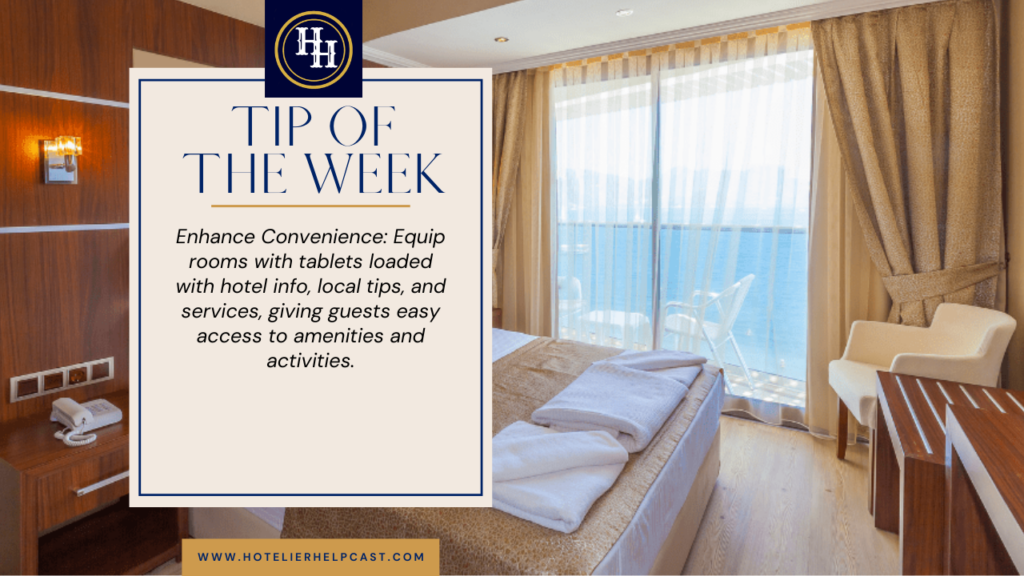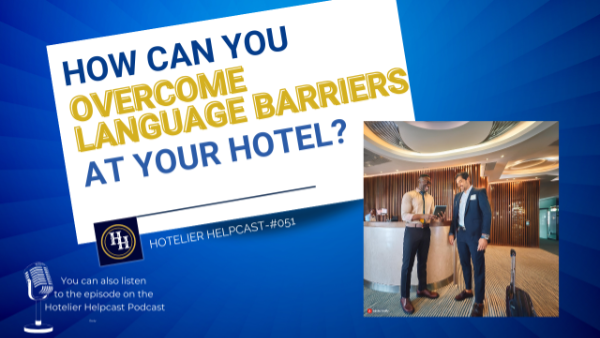-
Language Does Not Have To Be A Barrier at Your Hotel.
- You’ll learn practical tips, from tech tools to staff training, to ensure smooth communication with guests from all language backgrounds.
- How Can Independent Hotels Maximise Exposure On OTAs?-055
- How Can Updating Your Hotel’s Amenities Boost Guest Satisfaction?-053
- Building Strong Hotel Local Partnerships Is Key To Success-052
Language Does Not Have To Be A Barrier at Your Hotel.
You’ll learn practical tips, from tech tools to staff training, to ensure smooth communication with guests from all language backgrounds.
Imagine this: A guest arrives at your hotel after a long journey. They’re tired, and looking forward to a smooth check-in, but there’s one hiccup – you don’t speak their language. Sound familiar? For many hotel owners, dealing with language barriers is a regular part of the job. But it doesn’t have to be stressful.
.
In this episode, I’ll walk through practical steps to help you and your team communicate better with guests from different language backgrounds. You’ll find some helpful tips and maybe even a few stories you can relate to.
 Embrace Technology as Your Friend
Embrace Technology as Your Friend
Let’s face it – we’re living in a digital age, and technology has come a long way in making communication easier. Gone are the days of awkwardly pointing at things, hoping your guest gets the message. Now, you’ve got translation apps at your fingertips.
.
Applications like Google Translate or iTranslate can be lifesavers. They won’t turn you into a fluent speaker overnight, but they’ll help bridge the gap. Many of these apps even have voice translation features, which can make conversations smoother.
.
I know of one hotel that started using tablets with built-in translation software at their front desk. The staff could hand the tablet to guests, who would type their questions in their language. It made things less stressful for both the guest and the front desk staff. Not only did it improve the guest experience, but it also made the staff feel more confident. It’s simple but effective.
.
.
Hire a Multilingual Staff
If your hotel is in a popular tourist area, chances are you’ll have guests from all corners of the world. This means you might want to consider having multilingual staff on hand. Think about it, what a relief it would be for a guest to hear someone speak their language right after arriving at your property.
.
A small boutique hotel in Vancouver, Canada hired a receptionist fluent in Mandarin. This was a game-changer for them because they saw a lot of Chinese tourists. The hotel’s reviews shot up, with many guests mentioning how at home they felt when they could communicate in their native language.
.
Now, hiring someone who speaks every language under the sun isn’t practical, but you can consider hiring staff who are fluent in the most common languages your guests speak. Even basic greetings in a guest’s language can make a big difference.
.
.
Clear Signage Saves the Day
Ever been in a foreign country and struggled to find the right exit or the hotel restaurant? It’s frustrating, right? That’s why signage is so important. Not just any signage, though – clear and multilingual signage.
.
It’s not difficult to add additional languages to your signs. Many hotels are moving towards pictorial signs – think icons for restrooms, dining areas, and exits – to make things clear without needing language at all. Pictorial signs are universally understood and can be a cost-effective way to tackle language barriers.
.
One trick I’ve seen in some hotels is a QR code on the back of room keys. When guests scan the code with their phones, it directs them to a hotel guide in their own language. It’s like having a personal guide in your pocket – no more wandering around looking lost.

Train Your Staff in Non-Verbal Communication
Let’s be honest – you’re not always going to have the right tools or people around to help with every language. That’s where non-verbal communication comes in. Body language, gestures, and facial expressions are universal tools that can go a long way when words fail.
.
It’s important to train your staff to be patient, smile, and use open body language. You’d be amazed how much of a difference this can make. A friendly gesture or a welcoming smile often conveys more than words ever could.
.
One hotel I know of in Germany made it part of their regular training to teach staff basic non-verbal communication techniques. They practised gestures, miming, and using visual aids like maps or brochures. Guests might not have understood every word, but they certainly felt understood.
.
.
Offer Translation Services
Let’s talk about the ultimate solution – professional translation services. If your hotel hosts high-profile guests or large groups from different countries, investing in a translation service can pay off. This might mean having on-call translators or offering written materials like menus or brochures in multiple languages.
.
.
Encourage Guests to Share Preferences
Let’s flip the script for a moment – what if you could avoid language barriers altogether by simply asking guests about their preferences before they arrive? Many hotels now include a field in their booking forms where guests can indicate their preferred language. This gives your team time to prepare, whether that means having materials ready in the guest’s language or arranging for a staff member to greet them.
 Imagine having a treasure trove of hotel management wisdom at your fingertips. That’s what you get with our guide, ‘Unlocking Hospitality Success: 25 Must-Know Insights for Independent Hotel Owners’. It’s your blueprint for building a standout hotel that guests can’t resist. Seize this chance to redefine hospitality on your terms. Download your free guide from the link in the show notes and start making waves in the hotel industry today!
Imagine having a treasure trove of hotel management wisdom at your fingertips. That’s what you get with our guide, ‘Unlocking Hospitality Success: 25 Must-Know Insights for Independent Hotel Owners’. It’s your blueprint for building a standout hotel that guests can’t resist. Seize this chance to redefine hospitality on your terms. Download your free guide from the link in the show notes and start making waves in the hotel industry today!
What’s worked best in your hotel when handling language barriers? Share your experiences in the comments.
In Conclusion
At the end of the day, handling language barriers is all about making your guests feel comfortable and welcome. By using technology, hiring multilingual staff, offering clear signage, and focusing on non-verbal communication, you can turn what could be a stressful situation into a seamless and pleasant experience.
.
Remember, even small steps like greeting a guest in their language can make a world of difference. And who knows, you might even pick up a few new words along the way!
.
In the next episode, I will talk about Building Strong Local Partnerships.
⇒ TO READ OR LISTEN TO THIS EPISODE ON KEYSTONE HOSPITALITY PROPERTY DEVELOPMENT
https://hotelierhelpcast.com/2024/10/how-can-you-overcome-language-barriers-at-your-hotel-051
.
Serious about taking your business to the next level? Sign up for the “Check-In to Success-Building and Running Your Hotel Business” course
.
Grab your copy of the “Unlocking Hospitality Success: 25 Must-Know Insights for Independent Hotel Owners” PDF
hotelierhelpcast.com/success-25-must-know-insights-for-independent-hotel-owners-download
.
Join our groups
.
Listen to The Hospitality Property School PODCAST here
.
YouTube Channel
Gerry MacPherson
Say hi on social…
A Division of Keystone Hospitality Property Development
The Psychology of the Hotel Repeat Guests: What Really Brings Them Back?-110
Are You Working On Your Hotel Business or Just In It?-109
How to Spot Hotel Burnout Before It Wrecks Your Property-108
- 1
- 2
- 3
- 4
- …
- 37
- Go to the next page




